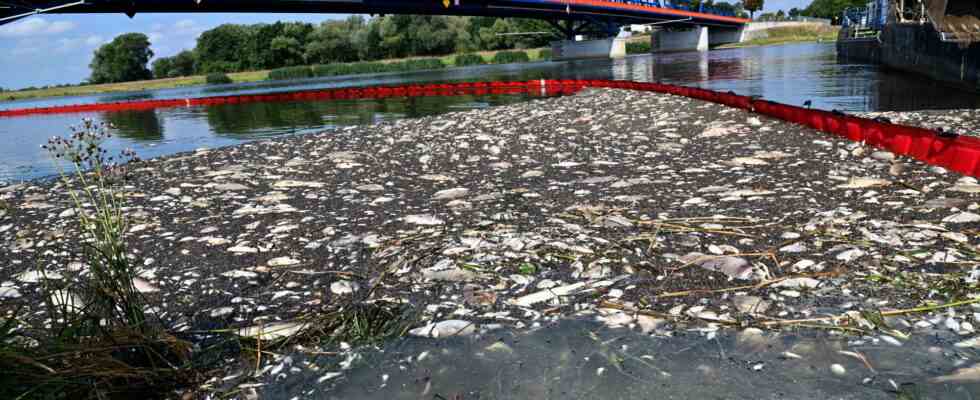Status: 08/31/2022 12:02 p.m
The death of fish in the Oder brings the issue of environmental crime back into focus. The federal government wants to take action against it. But the federal states are responsible for law enforcement – and there is a lack of staff.
It has not yet been conclusively explained why the fish in the Oder are dying. The investigations in Poland and Germany are ongoing. A toxic species of algae that actually occurs in salt water could be to blame – in combination with low water levels and high temperatures. Too much salty sewage may have been discharged into the river. Polish authorities recently reported that they had discovered more than 280 illegal discharges.
Federal Environment Minister Steffi Lemke traveled to Brandenburg in mid-August to get an idea of the situation on site. “The priorities are now damage limitation, the protection of the population and identifying the cause and the potential perpetrator,” said the Green politician at the appointment on the Oder. “This environmental crime needs to be solved.” Combating environmental crime in Germany could become more important in the future. Politicians and experts are calling for an increased focus on this area and are calling for the creation of new structures and better positioning of the responsible authorities.
New EU directive planned
According to a spokeswoman for the Federal Ministry for the Environment, an increase in human resources and organizational structures in the police, customs, public prosecutor’s offices and the supervisory authorities of the environmental administration is considered sensible. Environmental crimes should not be considered “trifles”. She also refers to a planned new EU directive on environmental criminal law, which is currently being negotiated in Brussels. This includes, among other things, minimum maximum penalties and regulations for skimming off illegal profits as well as the use of additional investigative methods.
According to police crime statistics (PKS), around 11,600 criminal offenses in the area of environmental crime were registered nationwide last year. These include water, soil and air pollution. According to a study by the Federal Environment Agency in 2019, the clear-up rate for environmental crimes has been around 60 percent in recent years, which is about as high as in other areas of crime.
However, experts assume a high number of unreported cases. Law enforcement agencies often lack the expertise, staff and time to carry out controls and often complex investigations. “These factors contribute to the fact that criminal offenses are either not discovered or cannot be proven in criminal proceedings,” says the investigation by the Federal Environment Agency.
In view of the deficits in the prosecution of environmental crimes, the Greens member of the Bundestag and interior expert Irene Mihalic pleads for the establishment of specialized offices in the federal and state governments, such as special public prosecutor’s offices and specialist police departments with specially trained staff, in order to improve criminal prosecution.
“Main field of activity of organized crime”
Environmental crime is a “main field of activity for organized crime,” says Marina Hackenbroch, deputy chairwoman of the Association of German Criminal Investigators (BDK). In addition to more staff, it calls for more expertise in the authorities. For example, the training and further education of investigators must be expanded and improved, and should be carried out as centrally as possible by the police.
The opposition also advocates a strengthened approach to combating environmental crimes, but also points to the staffing problem. “The processing of environmental crime is personnel-intensive because it requires controls independent of suspicion,” said Günter Krings, the legal policy spokesman for the CDU/CSU parliamentary group. The prosecution authorities and the laboratories would therefore have to be equipped with sufficient staff.
Environmental crime department in NRW dissolved
France’s interior minister, Gérald Darmanin, recently announced that he wanted to create 3,000 new positions for police officers in the gendarmerie, who would be responsible in particular for investigating environmental crimes such as arson in forests. Unlike in France, however, the prosecution of environmental crimes in Germany is the responsibility of the state authorities.
Some federal states already had specialized structures in the past. In North Rhine-Westphalia, for example, there was an environmental crime unit with expert investigators, which was dissolved by the black and yellow state government that was in power last. The new NRW government made up of the CDU and the Greens now wants to comprehensively combat environmental crime. According to the coalition agreement, a special public prosecutor’s office and a coordination center at the LKA are to be created for this purpose, and the environmental administration is to have 200 additional employees per year.
Many public prosecutors and courts at the limit
In order to be able to consistently prosecute violations of the law, however, more staff is urgently needed in the judiciary, according to Sven Rebehn, national manager of the German Association of Judges. This is particularly necessary in view of the planned tightening of environmental criminal law through the new EU directive. Many public prosecutor’s offices and courts are already working to the limit, and the proceedings often take a long time. The rule of law runs the risk of no longer being able to enforce its laws.
This problem is likely to get worse. According to the German Association of Civil Servants (dbb), there will be a shortage of around 360,000 employees in the public sector in the coming years. According to dbb chairman Ulrich Silberbach, the number of tasks for authorities and administration at federal, state and local level is growing faster than the number of employees. The public service is threatened with a permanent overload.

